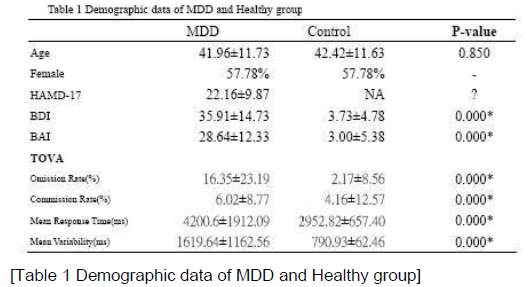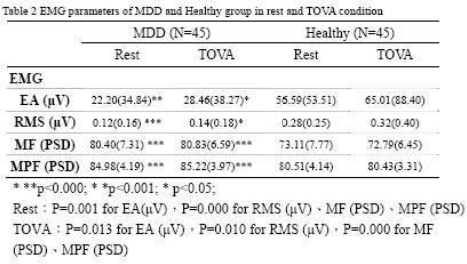Refine listing
Actions for selected content:
Volume 26 - May 2011
Contents
P02-12
Biopsychosocial consequences of interferon-alpha (IFN-alpha) therapy in patients with chronic hepatitis c infection
-
- Published online by Cambridge University Press:
- 16 April 2020, p. 606
-
- Article
-
- You have access
- Export citation
P02-13
Is serum folate level a predictor of response in depressive patients who failed to previous antidepressant treatments? a naturalistic study
-
- Published online by Cambridge University Press:
- 16 April 2020, p. 607
-
- Article
-
- You have access
- Export citation
P02-14
Effects of once-daily adjunct quetiapine XR on sleep disturbance in patients with mdd: a pooled analysis from two acute studies
-
- Published online by Cambridge University Press:
- 16 April 2020, p. 608
-
- Article
-
- You have access
- Export citation
P02-15
The relationship between depression and emotional intelligence among undergraduate students
-
- Published online by Cambridge University Press:
- 16 April 2020, p. 609
-
- Article
-
- You have access
- Export citation
P02-16
Classification of recurrent depression with seasonal pattern: a comparison between two diagnostic instruments
-
- Published online by Cambridge University Press:
- 16 April 2020, p. 610
-
- Article
-
- You have access
- Export citation
P02-17
Depression, inflammation and coronary heart disease: prognostical value of c reactive protein and depressive symptoms
-
- Published online by Cambridge University Press:
- 16 April 2020, p. 611
-
- Article
-
- You have access
- Export citation
P02-18
Effects of lithium on the HPA axis in patients with unipolar major depression
-
- Published online by Cambridge University Press:
- 16 April 2020, p. 612
-
- Article
-
- You have access
- Export citation
P02-19
An audit to identify factors that are more commonly associated with depressed patients on augmentation therapy under the befordshire east community mental health team (BECMHT)
-
- Published online by Cambridge University Press:
- 16 April 2020, p. 613
-
- Article
-
- You have access
- Export citation
P02-20
Predictive value of magnesium levels in depressed patients
-
- Published online by Cambridge University Press:
- 16 April 2020, p. 614
-
- Article
-
- You have access
- Export citation
P02-21
Somatic symptoms and high-sensitive C-reactive protein in major depression
-
- Published online by Cambridge University Press:
- 16 April 2020, p. 615
-
- Article
-
- You have access
- Export citation
P02-22
Effectiveness of a psychoeducational group intervention in patients with mild/moderate depression in primary care (PC): randomized controlled trial
-
- Published online by Cambridge University Press:
- 16 April 2020, p. 616
-
- Article
-
- You have access
- Export citation
P02-23
Electromyography change during the test of variables of attention tova in patients with major depressive disorder
-
- Published online by Cambridge University Press:
- 16 April 2020, pp. 617-618
-
- Article
-
- You have access
- Export citation
P02-24
Agomelatine versus escitalopram in major depressive disorders : a randomized double-blind, long term study focusing on sleep satisfaction and emotional blunting
-
- Published online by Cambridge University Press:
- 16 April 2020, p. 619
-
- Article
-
- You have access
- Export citation
P02-25
The prevalence of depression in patients with cushing’s syndrome
-
- Published online by Cambridge University Press:
- 16 April 2020, p. 620
-
- Article
-
- You have access
- Export citation
P02-26
The effects of psychodrama on depression among women with chronic mental disorder
-
- Published online by Cambridge University Press:
- 16 April 2020, p. 621
-
- Article
-
- You have access
- Export citation
P02-27
Unipolar depression and chronic medical diseases from the genetic perspective
-
- Published online by Cambridge University Press:
- 16 April 2020, p. 622
-
- Article
-
- You have access
- Export citation
P02-28
Prevalence of depressive disorders in shanghai children aged 8∼12 years
-
- Published online by Cambridge University Press:
- 16 April 2020, p. 623
-
- Article
-
- You have access
- Export citation
P02-29
The effect of lavandula angustifolia in the treatment of depression
-
- Published online by Cambridge University Press:
- 16 April 2020, p. 624
-
- Article
-
- You have access
- Export citation
P02-30
Family burden in major depression: a multicentric survey in 30 italian mental health centres
-
- Published online by Cambridge University Press:
- 16 April 2020, p. 625
-
- Article
-
- You have access
- Export citation
P02-31
Oxidative stress and brain glutamate-mediated excitability in depressed patients
-
- Published online by Cambridge University Press:
- 16 April 2020, p. 626
-
- Article
-
- You have access
- Export citation

